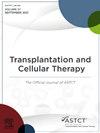Clinical effects of granulocyte colony-stimulating factor administration and the timing of its initiation on allogeneic hematopoietic cell transplantation outcomes for myelodysplastic syndrome
IF 4.4
3区 医学
Q2 HEMATOLOGY
引用次数: 0
Abstract
Granulocyte colony-stimulating factor (G-CSF) accelerates neutrophil recovery after allogeneic hematopoietic cell transplantation (HCT). However, the optimal use of G-CSF and the timing of its initiation after allogeneic HCT for myelodysplastic syndrome (MDS) according to graft type have not been determined. This retrospective study aimed to investigate the effects of using G-CSF administration and the timing of its initiation on transplant outcomes in adult patients with MDS undergoing allogeneic HCT. Using Japanese registry data, we retrospectively investigated the effects of G-CSF administration and the timing of its initiation on transplant outcomes among 4140 adults with MDS after bone marrow transplantation (BMT), peripheral blood stem cell transplantation (PBSCT), or single-unit cord blood transplantation (CBT) between 2013 and 2022. Multivariate analysis showed that early (days 0 to 4) and late (days 5 to 10) G-CSF administration significantly accelerated neutrophil recovery compared with no G-CSF administration following BMT, PBSCT, and CBT, but there was no benefit of early G-CSF initiation for early neutrophilic recovery regardless of graft type. Late G-CSF initiation was significantly associated with a higher risk of overall chronic GVHD following PBSCT (hazard ratio [HR], 1.63; 95% confidence interval [CI], 1.18 to 2.24; P = .002) and CBT (HR, 2.09; 95% CI, 1.21 to 3.60; P = .007) compared with no G-CSF administration. Late G-CSF initiation significantly improved OS compared with no G-CSF administration only following PBSCT (HR, 0.74; 95% CI, 0.58 to 0.94; P = .015). However, G-CSF administration and the timing of its initiation did not affect acute GVHD, relapse, or non-relapse mortality, irrespective of graft type. These results suggest that G-CSF administration significantly accelerated neutrophil recovery after BMT, PBSCT, and CBT, but increased risk of overall chronic GVHD after PBSCT and CBT. However, the effect of early and late G-CSF initiation on transplant outcomes needs further study in adult patients with MDS.
粒细胞集落刺激因子给药及其起始时间对骨髓增生异常综合征异基因造血细胞移植结果的临床影响。
背景:粒细胞集落刺激因子(G-CSF)加速异基因造血细胞移植(HCT)后中性粒细胞的恢复。然而,根据移植物类型的不同,G-CSF的最佳使用和异基因HCT治疗骨髓增生异常综合征(MDS)后开始使用的时间尚未确定。目的:本回顾性研究旨在探讨G-CSF给药及其开始时间对接受同种异体HCT的成年MDS患者移植结果的影响。研究设计:使用日本注册数据,我们回顾性研究了2013年至2022年间4140名成年MDS患者在骨髓移植(BMT)、外周血干细胞移植(PBSCT)或单单位脐血移植(CBT)后G-CSF给药及其开始时间对移植结果的影响。结果:多因素分析显示,与BMT、PBSCT和CBT后未给予G-CSF相比,早期(0-4天)和晚期(5-10天)给予G-CSF可显著加速中性粒细胞恢复,但无论移植物类型如何,早期给予G-CSF对早期中性粒细胞恢复均无益处。延迟启动G-CSF与PBSCT后整体慢性GVHD的高风险显著相关(风险比[HR], 1.63;95%置信区间[CI], 1.18 ~ 2.24;P = 0.002)和CBT (HR, 2.09;95% CI, 1.21 ~ 3.60;P = 0.007)。与PBSCT后未给予G-CSF相比,延迟启动G-CSF可显著改善OS (HR, 0.74;95% CI, 0.58 ~ 0.94; = 0.015页)。然而,无论移植物类型如何,G-CSF的给药和起始时间都不会影响急性GVHD、复发或非复发死亡率。结论:这些结果表明,G-CSF给药显著加速了BMT、PBSCT和CBT后中性粒细胞的恢复,但增加了PBSCT和CBT后整体慢性GVHD的风险。然而,早期和晚期G-CSF启动对成年MDS患者移植结果的影响需要进一步研究。
本文章由计算机程序翻译,如有差异,请以英文原文为准。
求助全文
约1分钟内获得全文
求助全文
来源期刊

Transplantation and Cellular Therapy
Medicine-Hematology
CiteScore
7.00
自引率
15.60%
发文量
1061
审稿时长
51 days
 求助内容:
求助内容: 应助结果提醒方式:
应助结果提醒方式:


